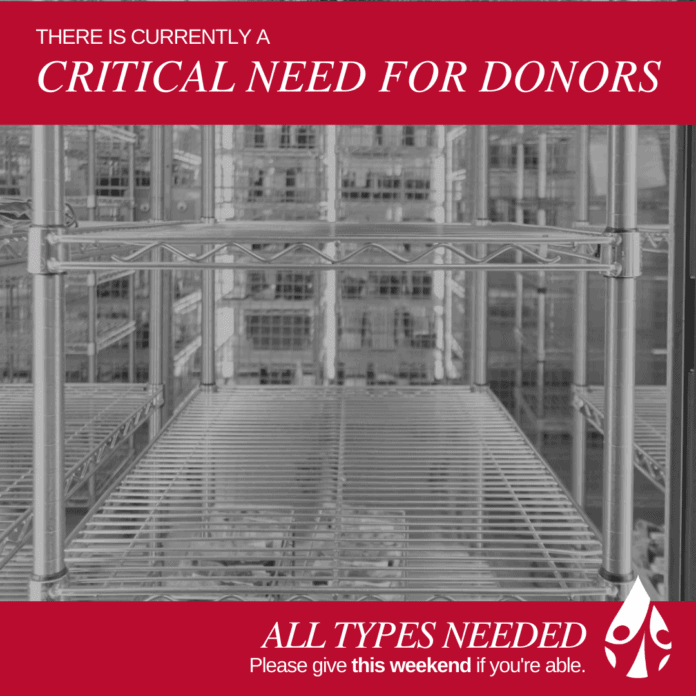It is OK for people to donate blood and plasma during the COVID-19 pandemic, officials say. Now, folks just need to get out and do it.
“It’s unlike anything I’ve ever seen,” said Linda Goelzer, director of public relations for Carter Bloodcare, which has locations in Grand Prairie and Mansfield. “We’re down to about a little over 100 A-positive and O-positive – and that’s because we got help from another center. We usually go into summer with over a couple thousand of these. We are not filling standard orders right now, we’re prioritizing requests.”
A-positive and O-positive are the two most common blood types in the nation, Goelzer said. Those types comprise over a third of the population. If a person has positive blood, they can get a transfusion with either positive or negative. However, if a person has negative blood, they can only get a transfusion with negative blood.
“We have a whole lot of people who are not positive. If we throw out a wide net and we can’t get the most common, what does that say,” Goelzer said. “We actually had a couple days this week when we had more O-negative than O-positive, and that is not normal.”
Need For Plasma is ongoing
Susan Berhane from the Grifols corporate affairs office, the company that owns Biomat USA in Lancaster says, plasma donations are in a similar situation
“Plasma is a portion of the blood that is used as the starting material to make life-saving medicines. It contains many proteins and antibodies that help our bodies function,” Berhane said. “Plasma is needed now more than ever to make these medicines. Patients always need these critical medicines, so plasma is also always needed.”
Berhane noted that plasma and blood donations are considered within the category of essential, critical infrastructure. Its exempted from general lockdown or stay-at-home closures pursuant to the President’s Coronavirus Guidelines and the U.S. Department of Homeland Security.
“We have been letting our donors know that they are essential through marketing and social media channels, as well as when they are in the centers,” she said. “We continue to work to raise awareness on plasma donation, and that plasma donation is a way that individuals can make a difference during this challenging time.”
Goelzer said once word got out in March that people could donate during the pandemic, there was a big turnout. However, now they need another big turnout.
Local blood shortage due to COVID-19
Goelzer said a big reason more donations are needed is that when hospitals dispensed with elective surgeries, the blood banks were left with blood that wasn’t being used. However, it must be used within 42 days. While it didn’t go to waste, it was sent to other places, including New York, the hotspot for the coronavirus, leaving an immediate shortage locally.
“Now, the message is ‘get out and get your surgeries now before the next wave (of COVID-19),’ so we need people to come back in, along with any new donors,” Goelzer said. “Thing is, there are a lot of people hurting. People’s heads are elsewhere. People don’t just wake up and think, ‘I’ll go give blood.’ We work hard to get the word out, but it’s up to them to respond.”
There’s also the challenge of, because of COVID-19, only a limited number can be in a center at any given time, Berhane said. However, facilities are strictly adhering to the protocol set forth by the Centers for Disease Control, she and Goelzer said.
“Additionally, some donors weren’t comfortable coming to the centers, and now as summer is approaching and cities are relaxing their guidances, we encourages these donors and new donors to come visit our center to make a difference and help save a life,” she said.
COVID-19 cannot be transmitted through blood
Goelzer reminds folks that COVID-19 cannot be transmitted through blood. And no one is allowed to donate without having their temperature taken, filling out a medical questionnaire and undergoing a few tests.
And, she said if you are wondering if you can donate blood because you have a condition such as diabetes or recently got a tattoo, you may be in for a surprise. She said simply call and ask if you can donate.
“It happens all the time, people going in and out of eligibility status. The biggest call to action right now is to just make the call. Don’t disqualify yourself,” Goelzer said. “If everybody who is eligible gave three times a year, we’d seldom have shortages.”
Goelzer said there are a couple of added incentives to give this month. June 14 is World Blood Donor Day and June 19 is World Sickle Cell Awareness Day. Also, September is National Sickle Cell Awareness Month and January is National Blood Donation Month.















